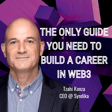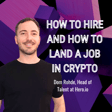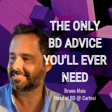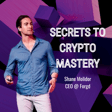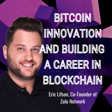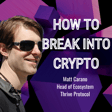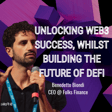Career Intentionality and Leadership Development
00:00:00
Speaker
But being intentional is probably the headline of like, make sure that you're going somewhere that isn't, you're not just jumping because it's on the table, but you're jumping because you're excited about it. But have you got any advice on where people can go to find a mentor or how to actually go about that if there isn't someone in your business? I think probably one thing that is also true is that everybody has to figure out the sort of leader that they want to be or the sort of leader that they can be.
00:00:28
Speaker
For people to successfully make the move from being an IC and being a senior engineer for example and taking a step into management you almost have to view management as a completely different career. I think you grow as an engineer in particular under those conditions pretty quickly. Is it right place right time or did you have some idea of a plan as to what you wanted to do and where you wanted to go? I was just going to say for me it's really important like you should
00:00:54
Speaker
work on things you're passionate about is generally a good rule of thumb.
Introducing Anthony Rose and MatterLabs Mission
00:00:58
Speaker
Hello and welcome to Behind the Blockchain. Today I'm joined by Anthony Rose, SVP of Technology at MatterLabs. Anthony, thanks for joining me. How are you? Doing all right, thank you. And thank you for having me. Looking forward to the conversation. Great. So, Anthony, for people who don't know who you are, could you introduce yourself, please?
00:01:16
Speaker
Sure. So I'm Anthony Royce, as you have introduced. I lead the technology team at MatterLabs, another team behind a protocol called DK Sync. Great. So what does a day in the life of the SVP of technology at MatterLabs look like? Probably not a constant. But typically, I spend the first half of my day
00:01:43
Speaker
on calls. So I'll be talking to the team a lot, you know, one on ones with the team leads, talking through, you know, technical design reviews, dealing with emergent issues, spend a lot of my time hiring. So, you know, at least for me, like, typically, the thing that I'll focus on is whatever in the organization needs some support that day, or just trying to find, you know, keep to a regular schedule with with the team as we, you know, go through the process of
00:02:09
Speaker
building ZK Sync. So it's a mix of technical calls, calls on the people's side. And then the second half of my day, I typically try to keep free so I can spend time reading, responding to things asynchronously, preparing updates, and sort of doing work again. Nice, nice. So could you introduce us to Matalabs and obviously ZK Sync in a little bit more detail, please? Sure.
00:02:39
Speaker
Matilabs is the company behind two protocols, actually, under the sort of z-casing umbrella. So the company is a few years old at this point, but it was created with the intention of, to a first approximation, scaling Ethereum. So the mission of the company is about
00:02:58
Speaker
like maximizing freedom in the world and the way that we can sort of contribute to this in our opinion is by you know building out these technologies and like helping public blockchains realize the potential that we see for them and in order to achieve this I mean the first problem at least in my opinion and I think many of us here is
ZK Sync Technology and Blockchain Challenges
00:03:17
Speaker
to think about how do we actually solve the scalability problem that comes with a theory.
00:03:21
Speaker
You know, for us, this is a really powerful and beautiful technology. But Ethereum as a system process is on average something like 15 transactions per second. So when you think about some future internet value where you've got an enormous amount of activity happening on chain, which is obviously not going to be happening unless we are able to increase the throughput of the system.
00:03:45
Speaker
So, ZK-Sync, there are sort of two pieces to the ZK-Sync story. The first one is a system which historically was just known as ZK-Sync, but then ZK-Sync V1 and now what we call ZK-Sync Lite. It's a zero-knowledge roll-up settling to Ethereum, and it's like an application-specific roll-up for payments. But I'll unpack a lot of these terms. This is probably quite a lot of jargon. But essentially the idea is that you can provide an environment
00:04:15
Speaker
that is much, much faster and much, much cheaper to use than, you know, doing activity on layer one, you know, Ethereum, when there's a lot of activity, the gas fees go up, right, this is just like dynamic pricing, and it can become very expensive to use. So if you want to do relatively straightforward things like send value from wallet A to wallet B, mint and NFT, you know, exchange tokens, these things can become prohibitively expensive for people.
00:04:40
Speaker
So zk-sync-lite provides an environment in which you can do these things at what we call a layer two, and then you prove the correctness of what the system is doing via a sort of cryptographic protocol known as zero-knowledge groups.
00:04:54
Speaker
essentially what it lets you do is prove a very succinct representation of all of this computational work happening on the system. So you get this sort of nice asymmetry between all of the work and then the sort of representation of that work on the theory. So it ends up being much much cheaper to build a system like this. The more exciting version of the system is actually the system that we're working on you know overwhelmingly today and it's been live I think for about
00:05:19
Speaker
three-ish months at this point for users, which is the general purpose extension of this idea. So zk-sync era, as it's known, is an environment which, to developers and to users, looks very, very similar, almost exactly the same as Ethereum, in the sense that it's a full, what we call a zk-EVM. It's a virtual machine, like the Ethereum virtual machine, the EVM, where you can deploy smart contracts, build applications, do all of the things you can do on Ethereum.
00:05:47
Speaker
And again, we proved the transition of this layer two, and we have this nice succinct representation of this general puppet system on Ethereum. So that was a lot, but it's a way to extend Ethereum using cryptography and using math to dramatically reduce the fees for users and provide this really high transaction execution environment. Interesting. I suppose that's one of the main challenges, I guess,
00:06:17
Speaker
taking blockchain mainstream is the cost of the transactions, right? If there's huge gas fees, it means that there's going to be less people using it. So it's a huge challenge to try and solve a really important one as well. Yeah. And I think we would argue that it's right to do it this way rather than compromise on the principles that make public blockchain special, right? Ethereum doesn't compromise on security, doesn't compromise on decentralization.
Anthony's Career Journey and Passion for Blockchain
00:06:40
Speaker
So how do you do it without sacrificing these nice properties?
00:06:44
Speaker
That's cool. So what first drew you to the role at Matalabs? So I've been following blockchain technology for a long time, not professionally as obviously as the case recently, but
00:07:00
Speaker
Right since 2013, I think was when I first read the Bitcoin white paper. I was doing a postdoc at the time. I'm sure one of my colleagues shared it with me and we were just discussing these ideas. But like many people in the space, it's this idea that it just took hold and it felt so compelling. And I was following the space basically off and on. And my interest ebbed and flowed over time, probably as a function of, you know, like the activity going on in blockchains.
00:07:29
Speaker
But for the last few years before joining Macilabs, it was very clear to me that this was where I wanted to be spending my time. So I had another job at the time. I'd be reading white papers, playing with different protocols, and just trying to develop intuition about what I wanted to do in the space. And honestly, for me, I wanted to only work on the problems that I found most compelling. And the scalability problem, in my opinion, is the most compelling. And then when I look at,
00:07:58
Speaker
The approach is to solve that problem. ZK technology was the one that made sense to me. And then inside the space, there's a bunch of teams working to solve a similar problem or working along similar lines. But the philosophy and the approach and the culture at Math2Labs resonated very, very deeply. And after a conversation with, I reached out, had a conversation with the team. And very, very quickly after that, I was handing my notice in and getting ready to start. So, yeah.
00:08:27
Speaker
It was a convergence of a few things. No, that sounds good. So what does it take to actually work at a business like MatterLabs? I can imagine it's a pretty fast paced environment there. It's definitely the case. So, you know, we want to, it's an unusual place to work, I would say, but our culture is not exactly like anywhere I've worked before and we're kind of deliberate in that direction.
00:08:55
Speaker
Um, the sort of things that we typically look for are, you know, firstly, like people have to care about what we're doing, right? Like it's a very mission driven place. And so first of all, if you don't really care about the problem, like.
00:09:10
Speaker
you know, this is maybe not the right place because a lot of us really do. And I think actually when you work at places like this, I've worked at other places, but I've had like strong missions. I really think it helps foster like valuable like second order effects in the culture. We also look for, you know, expertise and kind of independent of where you look in the company with sort of saying, like, how do we hire the best person in the world for this role? But on the technical side, you know, which is obviously where I spend most of my time,
00:09:39
Speaker
Yeah, we look for people who are experts in their domain or, you know, and it's not always going to be like the most senior person in the world, but how do you bring people in that are, you know, just like excellent engineers and motivated by the problem and really also going to kind of be well aligned with the culture. You know, we also want to work in a place where we are happy with our teammates and so on. So like we select for a few different things, technical skills and passion for the mission are probably the big ones. Yeah, I think
00:10:09
Speaker
I think that that whole mission piece is key, to be honest, you know, you see, I speak to companies all the time. And as one of the questions I always ask them is, you know, why should someone come and work for you as opposed to going to work at one of your competitors? And if the the hiring manager or the person doing interviews
00:10:29
Speaker
can't relay the mission and really kind of relay why somewhere is a good place to work because everyone says, oh, we have a great culture, but what's that actually mean? And I think being able to being able to underpin it with the mission of the business, I think is really, really, really key in getting good people. Yeah, I agree. And, you know, yeah. Sorry, I cut you off then. No, no, no, you get I was going to say, you know, for me, it's really important, like you should
00:10:56
Speaker
work on things you're passionate about is generally a good rule of thumb. And yeah, we spend a lot of time doing these things. If you care about it, it's going to be a lot more enjoyable. Yeah, I agree. And you've had a really interesting career up to this point. Obviously, we've had conversations in the past, and I've obviously seen you on LinkedIn and stuff. Can you talk us through your career journey so far and how you kind of reached the position that you are now? Yeah.
00:11:27
Speaker
My background originally was physics, so my PhD, so I started with PhD in postdoc. And at the time, sort of, I'd done my undergraduate and master's degree in physics, and I wasn't really sure the direction I wanted to go in. I really enjoyed writing code.
00:11:45
Speaker
And I really found a lot of motivation by certain areas of physics and in particular, it was particle physics for me. So I ended up doing a PhD and postdoc at CERN, which was also one of these occasions when you just happened to really be in the right place at the right time. It was like right when the accelerator was turning on through the discovery of the Higgs boson and just like a really interesting moment in the life of a phenomenally important experiment
00:12:15
Speaker
But I never planned to stay in academia. So during that time, I was writing a lot of C++, doing lots of machine learning, doing lots of statistics and experimental design. And these are skills that map pretty neatly onto a lot of what people also want to do in industry. So from there, I went and was a machine learning engineer and data scientist for some time, started as an individual contributor,
00:12:44
Speaker
began solving interesting problems, building machine learning models, doing work in industry. But I kept coming back to this passion also for building teams. So I had been a convener of a team during my postdoc where I was organizing a small team of researchers as we were working on one of the pigs discovery channels, we call them, and really enjoyed that side of the work. And I was at Uber where I
00:13:13
Speaker
began again in industry like managing teams so building out and managing machine learning and data science teams and went from Uber to SpaceX and at SpaceX I joined initially to do machine learning but it's a really interesting place where you pretty much pivot to the problem at hand independent of what it is an independent skillset you like figure it out so I spent about four years there and sort of
00:13:39
Speaker
Did a bunch of things that started with like data science, ended up looking a lot more like classical software engineering, distributed systems engineering. And again, sort of grew a team as I was there over time and ultimately ended up kind of having a relatively large team that I was working with on the software engineering side. And yeah, that led me to Mathelabs. And when I started, we were about 18 months or so ago at this point,
00:14:08
Speaker
I think the team is about 40 and we've grown a lot in the last year. So gone through an interesting series C, probably, I think the team is about 110 or so people today. So yeah, been a really amazing year with the launch of the system and a lot of activity in the first few months. But yeah, interesting arc, but there's like this common thread of building teams and sort of working on problems that are compelling. That sounds brilliant. Was your career route planned?
00:14:36
Speaker
So did you always know you wanted to achieve an SVP of technology? Because you've worked at some pretty great and reputable organizations. Obviously, did you PhD whilst at CERN and then Uber, then SpaceX, down MatterLabs? Is it right place, right time? Or did you have some idea of a plan as to what you wanted to do and where you wanted to go? There was never really a plan. Typically, the changes have always been
00:15:06
Speaker
points in time where the decision feels obvious. So, you know, really enjoyed working at Uber initially, really interesting place to be, lots of intellectual freedom, lots of resources for you to build interesting models, solve interesting problems. But honestly, for me, it wasn't like the deep mission that I'd always felt at CERN. And, you know, I think it's very difficult to do a PhD in postdoc if you're not passionate about what you're doing.
00:15:34
Speaker
But like working there with so many other, you know, motivated people was just like, really amazing. And honestly, when I was first moved into industry, I just felt like, oh, maybe you just don't ever have that feeling in industry. But it's basically for sure had that as well. And the team again, personally, that the team there is well class, people probably deeply care about what they're doing. And I are intentional about, you know, trying to
00:16:00
Speaker
collaborate in healthy ways to solve these heart problems. So there was no master plan behind any of the transitions. They were always me thinking about or having some opportunity to present myself that felt like a decision I couldn't say no to, right? Then SpaceX was sort of floated as an idea. This was just an obvious one for me. And similarly, the transition to working on ZK Sync just felt like a decision I just couldn't make any other way.
00:16:29
Speaker
Yeah. Just like follow, following this up. It has not been deliberate. Okay. Did you always have an idea that you wanted to be a leader of people or a leader within a business? Is that something you had early on? As you said, you kind of built and led a team when you were doing your postdoc and stuff.
00:16:48
Speaker
Early on, it was definitely not obvious to me that this was like the path. Like I really enjoyed, for example, just like unpacking machine learning papers and building the systems. I never expected to not be doing that. And there were just like opportunities that mostly early on, it was like, somebody needs to step in and do this. For example, I think at Uber for a while, we had an open wreck for the data science manager for the team that I was on at the time.
00:17:17
Speaker
I want to say for probably the best part of a year, we were interviewing and rejecting candidates. And in the end, the director of data science just
Leadership Skills and Team Culture
00:17:25
Speaker
asked me to do it. So I was like, all right, cool. It didn't feel unlike my postdoc in the sense where the postdoc was, I was one researcher. There were many other researchers. We were doing similar work. I could help coordinate the work. And this felt like
00:17:41
Speaker
It felt very similar to Uber. I was a data scientist. I had more junior data scientists and machine learning engineers. I could standard them with a whiteboard, help them figure out the problems that they were working on. We could come up with a plan and they could execute and we can coordinate together. And then at SpaceX, I think was where I realized that there was a lot more to the role than that. And I think
00:18:05
Speaker
It isn't just like, how do you think of, you know, junior engineers as a sort of like technical extension of the thing that you're already an expert in? It's a much different role than that. And it was working with, you know, there were some super inspiring leaders there and just, you know, four years of running different teams, building different teams, lots of different sort of leadership challenges. That side of it is like super compelling to me and I really enjoy it and find building teams to be, you know,
00:18:33
Speaker
one of the ways you can, you can contribute is like, how do you like, uh, use some of your experience, like serve other engineers and help build an environment in which they can achieve things and you can kind of just play that support role. And I really, I really liked that side of it. No, it's great. I'm sure a number of people listening and watching, uh, will be wondering this question as well. What's it like to work at SpaceX?
00:19:01
Speaker
Honestly, in many ways, it's very similar to my day to day today. So there's, you know, it's an environment where there is a pretty singular focus on what you need to do. And that singular focus varies as a function necessarily of which team you're on. You know, for a long time, I was working on the styling project, other times I was working on Falcon, like you very, very like have a very clear idea of what needs to be achieved as an organization.
00:19:27
Speaker
And you have a very clear idea about how you contribute to that piece. It's a place, and Matalan's actually, we have some similar philosophy of deep ownership and responsibility for the thing that you're an expert in. It's definitely an environment that is challenging. It's just like,
00:19:48
Speaker
How do we work on the hardest problems and like only work on the hardest problems we need to solve to achieve this big thing together? So you attempt to basically like cut all of the fat out of the plan. You have a very small team. Like aerospace is not resourced in a way. Like for example, technology companies typically might be right. Like Google, Amazon, these kinds of companies have this huge asymmetry between the number of engineers like building the thing.
00:20:13
Speaker
and then the number of users using the thing. And it typically means they're super well resourced. Like aerospace is not like that. So how do you, under pretty resource constrained conditions, solve hard problems? And I think it breeds really good engineering practices. It's a challenging place to be, but if you are interested in being in a culture with lots of people who care deeply about what they're doing,
00:20:38
Speaker
lots of people who are typically expert in what they're doing. And lots of people who are like, yeah, just like super motivated to move fast. This will suit you well. And I think you grow as an engineer in particular under those conditions pretty quickly. And a lot of that, I think the best parts of that culture are stuff that I would like to see everywhere I am. Like I really enjoy aspects of that and math a lot. And I think, you know, the question becomes, you know,
00:21:05
Speaker
When you're building a startup, what is the culture that you want? And I think a lot of us on the engineering team at MatterLabs, and actually the broader team, bring aspects of all of the best things we've seen in the past. So there's not one inspiration for the way that we do things, but how do we want to do things today? And how do we take the best things of all of our backgrounds? And there's a lot of people with very, very interesting previous career trajectories or different ideas. And you attempt to merge them in a way that makes sense, given the problems you're working on today.
00:21:34
Speaker
I don't think you can import anything from culture directly. You have to figure this stuff out again for where you are at this point. Yeah, I agree. I think that whole piece around being relatively under resourced and still having to find ways to get the job done. I think that that whole piece really breeds a huge amount of innovation. It kind of forces you to think how can how can we do this as efficiently as possible or how can we
00:22:00
Speaker
How can we do something without checking tons and tons and tons of money at it or tons of people, whatever it might be? I think it forces you to think of a problem in a different way, which is an exciting place to be, especially if you, by the sound of it, you've been at the forefront of a lot of innovation, right? So I guess that's an exciting place to be. Yeah, I think it forces you to A, only work on the interesting problems. Like even for SpaceX, the Matter Labs, like nobody in the team is working on stuff that I would consider a nice to have.
00:22:29
Speaker
even if you bring an intern in, the intern is typically working on something extremely important. But yeah, to your point, right, you have, when you don't have infinite resources, you have to think carefully and you have to think about performance, about cost, about efficiency, like all of these things are super important, which means like the engineering is probably got to be thought through to a level that it might not otherwise have to be.
Mentorship and Feedback in Leadership Roles
00:22:54
Speaker
So could you talk us through then the most important skills that you've developed along the way, which has really helped you to achieve your position? Whether that be technically or more on the softer side, what would have been the most important to you? Yeah, on the technical side, obviously it depends on the domain that you're in. But definitely I think for anyone earlier in their career in particular, it's really important to go as deep technically in your domain as you can.
00:23:24
Speaker
And to figure out the thing that you're passionate about and motivate to learn more about it. Because I don't know, at least for me, most of the time I was spending time thinking about, for example, the machine learning side of things, it wasn't motivated because I was like, oh, I have to get really deep technically. I'm going to slog my way through these books or these lectures, whatever it was. It was genuinely interesting. And I was spending time on it because it was interesting. And when I would go home, I would read blog posts about what I'd been thinking about that day.
00:23:54
Speaker
work on ideas I had for interesting things that we could experiment with. And I think when you have that momentum behind the thing that you're working on that deepens your understanding, this is a really useful pattern. There are areas of technology that I probably find more boring than some of the things I've spent time on the past. But it's not true for everyone. People have different passions. And I really like that side of it, because you can build complementary teams where people care about different aspects of the system.
00:24:23
Speaker
But I definitely think going deep technically on something you're passionate about is really important. There's value also to breadth. And you can think differently about how do you want to optimize for breadth or depth. On the side of building teams, honestly, early on, I really didn't think leadership was a learned skill. I really thought that you sort of just like, I'm a software engineer. I've become a senior software engineer.
00:24:54
Speaker
Naturally, I can work with more junior software engineers. This is super wrong. Now, I would argue there is so much actually that you can learn. And like, for example, SpaceX had these really nice leadership sort of internal training sessions where they would talk you through material. A lot of it is definitely a skill I would argue. How do you give good feedback? How do you communicate through difficult things? How do you motivate? There's so many pieces to it that
00:25:22
Speaker
Some fraction of it you get with experience. Some fraction of it I think is you are able to short circuit to a degree by talking to people, learning from people, like reading material, depending on the way that you learn.
00:25:35
Speaker
I think probably one thing that is also true is that everybody has to figure out the sort of leader that they want to be or the sort of leader that they can be. And at least for me, there are definitely been people when I kind of think back to where I was earlier in my career that stood out as amazing technical leaders. I sort of even today think about, you know,
00:25:59
Speaker
when you're confronted with a new situation, you like draw back to times that maybe you've experienced something similar in the past. And I definitely find myself doing things today that I can see in some of the people that really inspired me probably earlier in my career. But nobody I don't think there's one one way to be a leader. I really like I'm like sure that I've seen very, very different people with very, very different approaches.
00:26:21
Speaker
be very very successful. So you have to figure out what makes sense for you and actually like try to be authentic to who you are in the right way that you think you should approach a problem. I don't think there is one right way and I think you know you just sort of have to do what seems correct to you I guess. That's good advice. I had a really interesting conversation with another guest on the podcast actually, someone called Abhinav who is the ex-director of engineering at Polygon and he was saying that
00:26:50
Speaker
He believes that in order for people to successfully make the move from being an IC and being a senior engineer, for example, and taking a step into management, you almost have to view management as a completely different career as opposed to being an IC.
00:27:07
Speaker
And if you go into it, the mindset of, oh, it's just an extension of my day to day, then you'll probably really, really struggle in that scenario. Whereas if you view it as right, I mean, I'm entering a new career with a new career path, with a new set of skills I need to learn, because if you can do that, then you're more than likely succeed just by having that mindset mindset shift, which I thought was really interesting. Yeah, I fully agree. It's 100% a different role, in my opinion. You,
00:27:34
Speaker
have to do it very deliberately. It's probably the other thing to add. I think in some places it can feel like managers may be more on the inside of the conversation. They go to the room, think about the planning, think about the strategic direction. And sometimes I think as an engineer, you can be drawn to being part of those conversations.
00:27:54
Speaker
And I've seen places in the past where to be on the inside of those you had to say, oh, I'm the lead engineer now. And there was this sort of unusual coupling between that sort of like strategic piece and the management piece. This is probably a really unhealthy way to like couple things, because I think you end up mixing the incentives for somebody to want to be a people manager or to want to be a lead engineer or whatever is titled.
00:28:18
Speaker
Yeah, I would fully agree. It's a very different role. And I think you can find these hybrid models where you've got a lead engineer who's maybe 50% of the time, effectively a senior engineer, 50% of the time doing people management stuff. And at some point in your career, I do think if you're going to be, typically it's the case that at some point, you're almost in a position where you have to commit. A very senior people manager is unlikely to do a huge amount of coding. And it can be uncomfortable to step away from that. This has been a big part of your focus.
00:28:48
Speaker
I also think it's really healthy to attempt to not get too removed from it. You don't want really necessarily to be in a role where you're deeply decoupled from the technical piece. This is important to think throughout. How do you actually maintain that connection? But yeah, you should be very intentional about this change. It's not the same as having six to eight hours a day to just be heads down, deep work, thinking about hard problems. Even your day is different.
00:29:19
Speaker
30 minutes, 30 minutes, 30 minutes, like tons of content switching. Jumping into other people's problems in a way that maybe as an individual contributor, you would have never had to worry about before and you're dealing with very different things and good and bad, like super interesting problems, like people problems and coordination problems and team problems are still interesting and compelling and like fixing them can also be good ways to help the technical piece of the system go faster.
00:29:44
Speaker
Yeah, for sure. So you've probably actually think you've touched on quite a lot of the next question I was going to ask, which is all around if someone's stepping into a leadership role for the very first time. And is there any other advice that you would perhaps like to give them on top of what you've already shared? It's always a tricky transition. And I think probably a lot of it, you just have to sort of jump in and try to manage in terms of being well prepared. I do think
00:30:13
Speaker
Having mentor or mentors is a useful thing if you can find people whose opinion you trust because situations will sometimes be like having an obvious outcome and it's, you know, not, you know, most day to day, like probably things are quite normal, right?
00:30:30
Speaker
When you get to that point in your career, you probably have a good amount of experience already and you probably have an idea about what you want to do and what you think has made sense for you in the past. But it's always useful when you confront difficult things in management to have other people that you can talk to. And like having those sorts of relationships is really useful.
00:30:47
Speaker
you know, when you confront harder things like performance management, this is the first few times you can go through this, I think it's probably uncomfortable for almost everybody, right? You're not used to necessarily a giving hard feedback, often senior engineers will be but not always. But like heading towards really difficult conversations is something that I think is useful to have a counterpart to talk to. And then just in general, you know, I think
00:31:13
Speaker
Leadership is a land skill. As I sort of mentioned earlier, I think finding resources that resonate with you is also useful. And again, it's not, I think, one way to do this. Different resources will resonate with different people. People have different styles. People want to build different cultures. So I think finding examples that would make sense to you if you are on the other side of the conversation and thinking through some of these pieces are useful ways to sort of expand your ability to grow as a leader.
00:31:43
Speaker
And then also I think, you know, maybe not obvious, but like getting feedback a lot, I think is healthy, even though maybe I think it can sometimes feel difficult for like a new leader to get feedback from their peers. You know, there's sometimes it's like impression that you should now be the authority. And typically I think this is, you know, probably not ideal. Yeah, I think, I don't know, getting feedback from the team, feedback from your peers, having a good support network, finding resources that resonate with you.
00:32:13
Speaker
And again, I think the only thing that I think makes sense is just try to be authentic to who you are. Try to understand the problems that your team has in particular and think through those problems. And I wouldn't say you can go read a book and just take the advice from that person in that book and project it onto your team. I do not think this works. I think it's useful to go read it and try and understand the context in which it was given, but then interpret it in a way that makes sense to you.
00:32:41
Speaker
Honestly, much of the book you might read, you should probably just discard, right? Take it and think about it. If it doesn't resonate, just discard it. Because a lot of it comes with experience. You go through situations and you figure out what you could do better also. You reflect on your behavior and you reflect on the outcomes and try to iterate and grow. Yeah, that's brilliant advice. I remember the first time when I first stepped into a leadership role and I had to have my first difficult
00:33:10
Speaker
conversation with someone. I remember being super nervous at the time, but obviously it's the first, the first time you go through it. And I think I'd spoken to my director at the time and we sat down and had a meeting before the meeting about how I was going to approach the meeting, what I was going to say and all this kind of stuff. So, and even then I was super nervous. So being able to find someone, I guess you can
00:33:30
Speaker
he can tackle it with you, I think is a good thing. But to be honest, a lot of people don't necessarily have access to those types of people in their businesses, right? I mean, this was one of the ideas for the podcast so that the people that don't have access to mentors can listen to people like you who have achieved certain positions or can pass on your advice and things like this. So I think it can be quite difficult for people to find
00:33:54
Speaker
a good mentor. Have you, this may be putting you on the spot a little bit, but have you got any advice on where people can go to find a mentor or how to actually go about that if there isn't someone in your business? Yeah, this is a great question. And I think firstly, I would say people are typically quite giving of their time or like many people are giving of their time. And I don't think it's a bad strategy to say like, okay, I want to find somebody who's maybe a good example.
00:34:24
Speaker
reaching out to people on LinkedIn and just saying, hey, do you want to grab a virtual coffee? I actually think that a lot, well, people will say yes to this. So not everybody, but this is a strategy that I think if you, if they're sort of, you know, for a new manager, like reaching out to somebody that you either know or know indirectly through your network, or even somebody who's like,
00:34:45
Speaker
in an area that you're sort of maybe aspiring to get towards it someday. And just saying like, hey, I'm new manager. I'd love to like grab a virtual coffee or even in person if you happen to live in each other and just get some advice. I really think that more often, well, at least on some occasions, people will say yes. And this is like a strategy that if you find that person to be a useful counterpart, maybe it happens again or again. This is at least one way.
00:35:11
Speaker
depending on which area you're in. I think also networking at conferences, things like this are typically good ideas. But at least for me, probably mostly it's come with people I've worked with in the past. And when I was a senior engineer and there was a leader I had a lot of respect for, even if that person is now doing something very different, I would have reached out to them and said, hey, you know,
00:35:37
Speaker
always appreciated working with you. I'd love to just chat and make doing this now and would appreciate your thoughts on something. And again, yeah, in the past, this was a pretty successful strategy for me. And yeah, I think, again, probably a million different ways you can kind of approach this, but finding people who have the advice you appreciate and then attempting to just like, have that sort of like, one on one conversation and can do it in person, you can do it virtually, but this is probably a good way to start. Yeah, I agree.
00:36:05
Speaker
I agree with you when you said, yeah, reach out to people on LinkedIn. I think people are really willing to help. You know, I generally do think they are. I mean, I don't know. Obviously, you might be able to say, but I don't know anyone really who's reached out or anyone that I know who would think to then reach out to a senior leader like yourself and say, hey, I'd really need your help or advice on this particular topic. You know, I don't really know anyone who does that, but I can imagine that that would actually get a lot of response and people would be really willing to jump on and help.
00:36:35
Speaker
It's tricky. I've definitely had those conversations like where I've been on one side of it. And it's also, you know, there's a piece that I think for the leader is like nice too, right? You know, I, for example, have had a bunch of conversations with people that used to be engineers on my team who are now team leads or managers and have reached out to talk about a thing or talk about applying for the lead role and, you know, wanted to chat to their interview or like even just like over the phone, run through that presentation with me in 15 minutes.
00:37:05
Speaker
And like for sure, I would do that. I would do that all day long, right? It's really rewarding to think of like individual engineers that I was working with in the past that are like motivated to do that. And like clearly, or at least like took something from what I was doing at the time that, that they thought that my advice would be helpful. Um, I think people were, not everyone would be receptive to this and like people get busy, but some people will say yes. And I think, yeah, this is a strategy I would definitely recommend at least attempting. Yeah, I like it. I like it.
00:37:33
Speaker
I also think something you mentioned previously as well regarding feedback, being able to get feedback from the team and also your peers as well. I think that is key really to success. I think to be a successful leader, you have to be able to give but also receive feedback and be receptive to that feedback, not take it personally and be able to receive that constructive criticism. Because I think how you think
00:38:03
Speaker
you think that you're portraying yourself in a certain way, and then other people will see that drastically different. So actually being able to understand how people view you and how they maybe view your communication, for example, or the way you might have explained something or whatever it might be, I think is key to really understand that and then be able to then take that advice on board and then action it. It's a skill being able to take feedback, I think is a skill.
00:38:32
Speaker
I really agree. I mean, like typically people, you know, particularly in high performing places, people are almost, you know, uniformly trying to do their best. And if there's something that is like not functioning in the way that they would expect, it's useful to know about that. And you can, you know, take steps to change it where it makes sense to. Yeah, for sure. For sure. So on top of what you already said, is there anything you really need to think about to run a successful technology team?
00:39:03
Speaker
I don't think it's down to the leader in a sense. The team is the sum of its parts. And the leader has, I think, some outsides say in things like the culture and the processes and things like this. But I think ultimately to build a team, well, I mean,
00:39:26
Speaker
different teams can be successful and look different ways. So definitely again, there's no one way to do it. My experience definitely over indexes on places that select for people that are of a certain, that have certain characteristics and like want to work in a certain way. Like I personally want to work hard and I want to work on problems I care deeply about. So this is, you probably can build different teams based on the culture you're optimizing for.
Team Dynamics and Web3 Challenges
00:39:52
Speaker
In terms of other things, I think, you know, like,
00:39:55
Speaker
Just being intentional about what you're trying to do is probably the way to say it. Nothing will say the same. The thing that I've always found to be true is that you can sort of, at least as a leader, like you can sort of see the next six to 12 months, at least for places like Mafilabs, places like SpaceX, where things are moving very quickly.
00:40:17
Speaker
Six months from now, stuff probably is different enough that the decisions you made six months ago maybe don't apply exactly, and you should be suspicious of your own plans or decisions. I used to basically think I can organize this, so I had maybe a team of 20. Even today, we have a much bigger team. And I sort of think you can probably organize the team correctly in terms of team composition, team processes, the sort of organizational pieces of it. You can probably organize it correctly for about six months at a time.
00:40:44
Speaker
But every six months, A, if you're working on only the critical problems, likely the problems you're facing are different. So should those teams still be together? Should you reorganize teams? These things are questions you should ask yourself. I think, yeah, nothing is permanent. And if you can keep iterating and changing and tweaking and adjusting,
00:41:05
Speaker
this is typically at least one way to be successful, assuming you're at least right more than you're wrong with the tweaks that you make, right? Like experimenting with a thing, continuing if it's working and changing if it's not, but balancing that with the ability for teams to have continuity, the ability for teams to like form and for, you know, a team isn't just say five or six people, like it's much more than that. Like a team is like,
00:41:33
Speaker
You know, there's things that have to happen regarding like people have to like build trust. People have to figure out the right communication strategies. People have to figure out like the way that they work together. And like a team has a lot of dynamics that take a little bit of time to form and teams don't just be like, all right, you five work together. Cool. Like this is the problem. Let's go. Stuff takes time. So you need to balance disrupting that with, uh, with continuity in a way that like makes sense given the landscape of the things that you're trying to like solve for. So.
00:42:03
Speaker
Yeah, I don't know. Like, you have to continually evaluate the thing that you are looking at in the future and just make sure that you feel like you're lined up against it correctly. And in some cases, that would look like continuity. In some cases, it would look like change. And work with the team, right? Just going into a room and making some decisions on your own and coming back and being like, here's the new plan. Like, it's probably going to be less successful than being collaborative. Like, having people have a genuine voice, like independent of the title in the organization, it really doesn't matter, right? Good idea is a good idea.
00:42:32
Speaker
And thinking through it, like, how do we lean into good ideas? How do we make sure we have a culture which surfaces good ideas? Yeah, there's lots of stuff that I think go into thinking about how to run teams effectively. Yeah, you're right. Because I actually think some of the best ideas that I've seen or that I've ended up implementing into the team have come from some of the newest people in the team. It might be their first job coming into recruitment, for example. And they've joined the team and said, you know, I think we need to do this.
00:43:01
Speaker
Why have we never thought that before? Absolutely. Let's implement it straight away and then you go away and do it. And yeah, it becomes this great thing. So yeah, now I completely agree with what you're saying there. Has working in Web3 changed how you believe companies should run or teams should run or change your perspective on hiring and building teams at all?
00:43:24
Speaker
I honestly don't know if Web3 itself has changed anything. I think different domains have different solutions probably in general. I don't know if I would say there's this one way to do it in Web2, one way to do it in Web3. In fact, I would say I don't think there is.
00:43:40
Speaker
You know, for like truly high performing teams, I have seen common patterns and it doesn't really matter if it was, you know, thinking through a really like, uh, maybe sort of almost quote unquote classical, like web to world, like Uber, aerospace, obviously the space X with ZK sink. Like there are characteristics I would say I've found to be common, but the sample set is also like small and it's very specific to the sort of environments I've selected for and, you know, the way that I think about things. So.
00:44:09
Speaker
I don't think it's web three. I think there are characteristics that I think make sense to me in a pretty deep way. Um, but it's been somewhat more like domain agnostic. I don't think there's particular things about web three necessarily that would change how I've thought about things. Okay. No, that's fair enough. And over the last few years, you've rather lost quite a few years. You must've interviewed tons of people, to be honest.
00:44:33
Speaker
Are there any common mistakes that you see people make that you'd really like to give advice on? There's probably a lot. There's, I mean, one of the things that's, you know, probably kind of goes without saying is that being prepared technically makes sense, right? The technical roles, almost not worth mentioning, but making sure that you're kind of ready to have the conversation. I think
00:45:02
Speaker
One thing that is, you know, again, maybe some of this is just obvious, but like understanding the company you're applying for is very, very useful. And like coming in with some expertise is in like at least what they're doing is useful to be able to like, you know, for a candidate, you're really interviewing the company as much as the company interviewing you, you know, moving somewhere is a big commitment and you should make sure you want to do it. And like, I think sometimes, particularly earlier in your career, you can feel excited to have an offer.
00:45:31
Speaker
But going to the wrong place can feel like an expensive waste of time. And you also maybe get there and you think, well, now I have to stay here for at least a year or two. So I would say there are good strategies. Like interview with a lot of places at once. This is typically sensible. You also, in a world where you get multiple offers, maybe have leverage to make sure you have the strongest offer. I would recommend most people attempt to interview at places where they are passionate about the mission. I feel like it would
00:46:01
Speaker
not be as fun to work a place that you don't care about the outcome. And this can be demotivating in a really systematic way. If you just don't care, it's difficult to motivate yourself every day. In terms of things that people have struggled with, one thing that's maybe, I don't know if this is obvious or not, is turning up with some enthusiasm and some energy is a really good idea.
00:46:29
Speaker
Typically, at least, you know, the way that we think about hiring candidates today is like, you almost want to say if it's not a hell yet, it's a no. So you really need advocates on the inside, you know, when there's a debrief, and there's sort of, I don't know, some number of interviewers discussing a candidate, it really helps a candidate to have somebody on that table who's like fighting for them. And I think this is common of lots of places that are trying to select for high performing teams across the industry. Because
00:46:54
Speaker
If everyone is pretty agnostic, the team might actually say like the de-proposition isn't there. And typically I think this is actually a good pattern to have in place in your hiring strategy because a false positive is pretty expensive, right? If you put a person into a team who immediately is struggling or immediately requires a lot of performance management, you've dramatically slowed the team down.
00:47:15
Speaker
And it can be very disruptive to a team that's trying to get things done. So people probably bias towards, on the interview side, having false negatives where they reject a good candidate over a false positive in which they hire someone that wasn't correct. So turning up a lot of energy, like being thoughtful, try to be that best version of yourself. I think in the conversation might actually go a surprisingly long way to having that connection with the interviewer.
00:47:44
Speaker
got the debrief happening when you're kind of, uh, offline after the call and somebody on the table, it was like your advocate. This is maybe a really helpful thing in many places. Um, yeah, I'm not sure being prepared. Yeah, you, you're completely right on the, the enthusiasm, uh, side of things, the amount of feedback that I get back from interview where the hire manager says, look, they were really good technically, but I just don't get enough from them.
00:48:13
Speaker
And obviously in the interview, you're putting your best foot forward, right? You're giving the best representation of yourself. So if you're not very enthusiastic during that first initial conversation during that interview, what are you going to be like six months into a job and it's snowing outside and you're getting up at 6 a.m. to go to work, you're just not going to have the right kind of attitude for the team, right? So yeah, showing the enthusiasm, I think, is a big one.
00:48:40
Speaker
And then, obviously, there's a lot of people coming into Web3 now, or obviously we want to get more people into the Web3 space and coming from Web2. How do you choose when you're interviewing and saying, as you said before, say you are interviewing a number of different places and trying to get your name out there and face out there as much as you can. How do you evaluate a project in Web3, whether or not it's going to be a reputable project or not? How do you spot somewhere you really want to go?
00:49:11
Speaker
That's a really good question. And probably one in which it's tricky to be right 100% of the time, especially if you're looking at places that are at the newer end of the spectrum in terms of like startups. The strongest signal is likely the team. You know, the more information you can get about the team that you're joining, the better. And
00:49:36
Speaker
Typically I would say, and this doesn't apply universally, but the past is a good indicator of the future, right? If you're chatting with the team and they, you know, you can see what they've done in the past. You can see that they worked on projects that, you know, are legit. You can inherit confidence that this is likely going to be in a good place as well. And maybe even, you know, if you look at the sort of, um,
00:49:58
Speaker
average quality of the background of the person that you're talking to during the interview process, you can probably inherit like some estimate at least like for the average quality of the project that you're talking to, like considering joining. For newer projects, you know, with a smaller team, I think really you are betting on the people and those conversations early on about what's the mission, what's the vision, if there is things that you can evaluate, whether it be
00:50:25
Speaker
products that are in production or technology that's maybe open source or whatever. The earlier the life cycle of the company, the more difficult it will be to evaluate and the more proxy signals you'll have to look
Web3 Innovation and User Experience
00:50:41
Speaker
for. For anything at any level of maturity, you can probably evaluate it pretty accurately if you know what you're looking for.
00:50:48
Speaker
does this product have active users? If it's in production and it's been live for a long time, it's a good signal for the future success. Not fully gonna determine the future, but it's a pretty compelling signal. Are people actually using this thing that I'm expecting to go build? Yeah, I would say it really depends on the project. It really depends on the type of application or protocol or team that you're looking to join.
00:51:14
Speaker
But one thing that's probably universally true is that you can evaluate the team that's working on it, and this will give you some sense for, you know, average quality of what's going on on the inside. Okay, that's good advice. And then technology aside, is there anything that you particularly love about working within Web3 as a whole? Yeah, I mean, like, for me, the, you know, when I was at SpaceX last two years,
00:51:43
Speaker
You work hard, but I'd be going home and thinking about these things all day long. When you're in that environment where you care about what it is, you're just drawn to it. And it's difficult to sometimes even know when my working day is, because obviously, there are some parts that very clearly work. There are other parts where I'm reading what other teams are doing, or watching lectures that maybe have been given, or watching conference talks. There's lots of things.
00:52:10
Speaker
don't really know the spectrum there's a spectrum from the stuff I'm doing it's like very obviously my day-to-day job to the stuff that probably I'm doing because it's interesting and I'm passionate and I like care about what these people are saying or what other people are doing so you know it extends all the way to like at the moment I live in LA and you go to parties and well less so at the moment but you know a year ago people were talking about NFTs all day like people
00:52:33
Speaker
there's a spectrum but for me like the technology has so much potential to be so transformative and I think you know just like trying to be a small part of like nudging it in a direction that makes sense like there are good outcomes I think for the world if we are successful what we do yeah I find the space super interesting like tons of smart people tons of interesting and creative ideas you know
00:52:59
Speaker
what you see in DPI, what you see in NFTs, what you see like in DAO. It's just like lots of innovation and interesting ideas that I think are continually like throwing up things that are curious to read about and kind of fun to think through. But for me, it's like the transformative potential for the technology is really compelling. And then the like weird creativity things that you see on the side of us, they keep the space super interesting all the time. And yeah, I don't know, never a boring day on crypto.
00:53:29
Speaker
I agree. I agree. So is there anything you would change about the space? I mean it's still more wild westy in some sense than I think it's healthy. Like we see a lot of people still getting scammed, still finding it difficult to
00:53:52
Speaker
We still need a really good UX. And I think this is part of the problem that we're trying to solve with DK Sync and get into the details of it probably better for another time. But how do we onboard the next billion people? It needs us to do things differently, right? It can't be the case that you need to manage seed phrases in a way that we do today. This just isn't going to work for people at scale. And we've kind of the history of sort
00:54:19
Speaker
password management, I think has taught us that already. So for me, it's like, I want to see the evolution of the space in terms of the infrastructure, but also the UX and making sure that it's safer for people to use. And actually, over time, the application there starts to abstract away the technology, right? Like when people are using Facebook or Snapchat or whatever it is, they're not thinking about HTTP or TCP IP or the underlying protocols, the power of this stuff. And I think over time, fewer people are going to care as a blockchain involved because
00:54:46
Speaker
Like today we care about the technology, but most people don't and most people won't need to when the application layer is really rich and it adds a lot of value. So I don't know if it's things that would necessarily change today, except, you know, it would be nice if people were able to be more secure than I think is sometimes the case today. But I think this comes with time and it comes with things like the work that we're trying to do and other teams in this space are trying to do as well.
00:55:10
Speaker
for sure. Yeah, I was going to ask you how do you go about improving the UX? How do you go about making it more secure and that sort of thing? Yeah, I would argue that we know how to do this. It's at this point just work and also people building with the tools and technologies that exist to solve this problem without getting too deep into the weeds.
00:55:34
Speaker
concept known as account abstraction, which essentially lets you build smart accounts rather than sort of the accounts that maybe people are most used to working with on Ethereum today, that start to give you a much more web to like, you know, you can do things like social recovery, still being fully custodial of your own keys, your own coins, that you don't have to go to some, you know, third party trusted
00:56:01
Speaker
service, you can maintain that strong self custody, but you can start to build, you know, much more user friendly experiences on top of it. And it goes even beyond just the security aspect. It's like, how do you build a world of gasless transactions where people don't need to think, Oh, you know, I've got to interact with this protocol, I need to have some heat or I need to have whatever this gas token
00:56:23
Speaker
These problems are all coupled and actually it's, you know, how do you build this account that is able to provide that user interface and that user experience that's really smooth, really clean, really intuitive, doing things in one click.
00:56:35
Speaker
not having to like you know try and unpack what you're signing and this like horrible blob of hex or something. All of this like we sort of know how to do right with zkting for example we decided to implement this concept this kind of structure natively in the protocol so application developers can just build with it from day one we do see people doing that
00:56:55
Speaker
And the experience of using the application is just so much cleaner than what many of us who have been in the space for a long time are used to. Even at layer one today, I still feel somewhat experienced in the space, but still really have to double check what I'm doing. Really be careful with what you're signing.
00:57:16
Speaker
And with, with things like account obstruction, you can build experiences, just feel a lot cleaner, feel a lot more secure. And, you know, just, you can imagine people outside of the space using them without the barrier to entry that I think they might otherwise have been.
Scalability and Privacy in Blockchain
00:57:30
Speaker
Okay. No, I like that. This might be quite a difficult question to answer and it's quite, um, it's quite broad maybe.
00:57:39
Speaker
If you weren't at MatterLabs, let's say you weren't building ZCasing, and you had an unlimited pot of money, unlimited resources, time, whatever it might be, any particular challenge in the web3 space you'd love to have a go at solving right now? This is a really boring answer, but I think scalability is almost like, in my mind, the only problem. If we don't solve this problem, then
00:58:08
Speaker
We just can't do what we want to do with public popchains. This is why I'm working on this problem. And if I thought there was a more interesting or more important problem, I would probably go work on that. If I fully taboo the idea of continuing to work on what I consider the most important problem, there is for sure other interesting things.
00:58:25
Speaker
One of the things I think we need to figure out is the sort of privacy layer on top of systems like Ethereum. You know, it's still the case that pseudo-anonymity is, I would argue, not enough in the fullness of time. You know, if you make a transaction today and I'm like,
00:58:42
Speaker
I'm privy to that transaction. And I can basically go and reconstruct everything you've done from that account. And I can really learn more information about you than would have been the case that had you made a corresponding cash transaction. I think things like that are really interesting questions.
Final Career Advice and Contact Information
00:58:57
Speaker
How do we start to solve that problem is interesting. And I'm excited to see lots of people working on that. And we see people building that sort of layer also on zksync.
00:59:10
Speaker
But yeah, for me, the boring answer is I feel like I'm working on the problem that I care the most about. And, you know, given the decision again, I would work on this problem again. That's great. I mean, it's brilliant that you found a role and found a company and found a problem that you're so passionate about. I think that's, you know, it's a really, really good thing. So to wrap up then, is there one piece of advice that you wish you'd have been told earlier in your career that you can pass on?
00:59:43
Speaker
I think I learned that you should be more deliberate in your decisions and take time to really consider where you want to be and what you want to work on. I've definitely found myself in a position where I was like, the technology is interesting, but the problem isn't. I'm interested in machine learning, but I don't really care why we're applying it to this specific problem. And at least for me personally, I just don't ever want to work on a thing like that again.
01:00:13
Speaker
My strong advice to everybody would be don't jump if you get an offer. And when you're, you know, earlier in your career, the first offer can feel like a really big one, particularly if you're transitioning from maybe like your academic life into that first offer. And in technology, those offers can be compelling, right? You know, this is a space which in some cases can pay well. But I would say if you can get one offer, you can get others. And you should take time to be really intentional about where you want to be. When you're interviewing with a company,
01:00:42
Speaker
really interview them as much as they interview you and think about like, are these people that I want to spend, you know, however long in the next few years where it's like day to day all day, like maybe the answer is no. And that's also fine. Right. I don't think, uh, yeah, my, my recommendation would be, be thoughtful about your decisions and go a little bit slow and do when you're very intentional about a change. Um, you can actually give yourself time to like, think about where you want to be, think about what you want the next few years to look like.
01:01:11
Speaker
And even like down select like, Hey, the short list of where I want to be maybe is like these three or four companies. And then maybe you include some at the edges. This maybe gives you some more leverage in case one of the ones at the edges makes an offer or they may also turn out to be more interesting than, you know, when you meet the team, sometimes it's way more interesting than you would have even expected going in. Um, but being intentional is probably the headline of like, make sure that you're going somewhere that isn't, you're not just jumping because it's on the table, but you're jumping because you're excited about it.
01:01:40
Speaker
That's great advice. Well, Anthony, thank you very much for your time today. It was great to speak. You shared some brilliant advice and it was really, really great to understand your career journey and the skills you've developed along the way. It was brilliant. Thank you very much for your time. Thank you for having me. Come to chat and appreciate your time. Yeah, no problem. And if people want to reach out, I know you've already said it and I probably already know the answer to this.
01:02:08
Speaker
If people want to reach out, if they do have problems that they need solving and they're stepping into a leadership role, is LinkedIn the best place? Is it Twitter? Where's better to catch you? LinkedIn or Twitter probably either will work. Both are the signal to the noise on my inbox is a mess in both. But for, yeah, I would say both a message will stand out more than just like a random connection because there are a lot of them. But like, yeah, for,
01:02:37
Speaker
In general, I would say like, if you're reaching out to people on LinkedIn, just like, I don't know, this definitely is something that I would read. And then, you know, there are many that just, just connect random connections. I kind of broadly ignore. But yeah, people are very welcome to reach out if, if I can be useful. Brilliant. Well, yeah, thank you very much for your time. I'll speak to you soon. Thank you. Take care.

